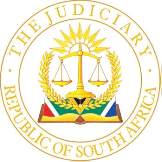
IN THE HIGH COURT OF SOUTH AFRICA
EASTERN CAPE DIVISION, MAKHANDA
CASE NO. 1284/2021
In the matter between:
TEKOA CONSULTING ENGINEERS (PTY LTD Applicant
and
ALFRED NZO DISTRICT MUNICIPALITY First Respondent
THE MUNICIPAL MANAGER:
ALFRED NZO DISTRICT MUNICIPALITY Second Respondent
ZINZAME CONSULTING ENGINEERS / CYCLE
PROJECTS / UBUNTU BAM JV Third Respondent
EMLANJENI JV Fourth Respondent
OLON CONSULTING ENGINEERS JV
IPM PLANT HIRE Fifth Respondent
BM INFRASTRUCTURE JV MAGNACORP Sixth Respondent
___________________________________________________________________
JUDGMENT
___________________________________________________________________
LAING J
This is an application for leave to appeal against the judgment handed down in relation to the award of a tender for the appointment of a panel of service providers for the planning, design and construction of Water Services Infrastructure Grant (‘WSIG’) funded projects for the Alfred Nzo District Municipality. The parties will be referred to in the same manner as their citation in the main application.
The applicant had sought an order that, inter alia, reviewed and set aside the decision to refuse to appoint it to the panel. It had also sought alternative relief that the decision to appoint the third to sixth respondents be reviewed and set aside and that the decision be referred back to the Bid Evaluation Committee (‘BEC’) and the Bid Adjudication Committee (‘BAC’) for reconsideration.
In its judgment, this court ordered, inter alia, that: the tender process be declared unlawful; the first respondent’s decision to disqualify the applicant’s bid be reviewed, declared unlawful, and set aside; and the second respondent’s decision to award the tender to the third, fourth, fifth and sixth respondents be reviewed, declared unlawful, and set aside.
The first and second respondents’ grounds for application for leave to appeal were to the effect that the court erred in deciding the issue pertaining to the formulation of the tender because no relief was sought by the applicant in that regard. Consequently, the court ought to have found that there had indeed been unreasonable delay on the part of the applicant. Finally, the court ought to have found that the applicant’s failure to have submitted proof of registration with the Construction Industry Development Board (‘CIDB’) meant that its bid did not satisfy the definition of an acceptable tender.
The third, fourth, fifth and sixth respondents’ grounds were, in essence, the same as those raised by the first and second respondents.
The court is of the view that the findings made with regard to the lawfulness of the tender process did not amount to findings on any decision with regard to the actual formulation of the tender itself. That decision was a separate matter entirely and did not form the subject of these review proceedings. Instead, the manner in which the first respondent applied the preference point system gave rise to one or more of the grounds of review listed under section 6(2) of the Promotion of Administrative Justice Act 3 of 2000 (‘PAJA’) and determined, ultimately, the legality of the tender process itself. This in turn led to the finding that the decision to award the tender to the third, fourth, fifth and sixth respondents was indeed unlawful, as contended by the applicant.
The question of unreasonable delay must be confined to the time period applicable to the institution of review proceedings in relation to the decision to award the tender to the third, fourth, fifth and sixth respondents. The decision with regard to the actual formulation of the tender itself was not the subject of the applicant’s challenge. The 180-day period contemplated under section 7(1) of PAJA only began from the date upon which the applicant had been informed or had become aware of the decision to award the tender and the reasons therefor or upon which it might reasonably have been expected to have acquired such knowledge. The court found that the applicant was within the applicable time period.
The specifications and conditions of the tender did not indicate, clearly and unambiguously, that the submission of proof of registration with the CIDB was a mandatory requirement. Any suggestion to that effect was vague at best. Consequently, the applicant’s failure to have done so did not mean that it had failed to submit an acceptable tender, as defined in terms of section 1 of the Preferential Procurement Policy Framework Act 5 of 2000 (‘PPPFA’).
The respondents’ argument that the provisions of the Construction Industry Development Board Act 38 of 2000 (the CIDB Act’) prevented the applicant from participating in the tender ignores the broad nature of the goods and services required for the project in question. There was nothing to have prevented the applicant from having submitted a bid. Whether it was permitted to supply or whether it was capable of providing the goods and services required was an aspect of the functionality of its bid, not its responsiveness to the specifications and conditions of the tender. The respondents have incorrectly conflated the two concepts.
Overall, the court has considered the grounds of appeal and the submissions made by the parties in terms of their heads of argument and at the hearing itself. Having taken the above into account, including the test for leave to appeal as summarised by counsel for the respondents, the court respectfully stands by the findings made and the relief granted.
In the circumstances, the following order is made:
the application for leave to appeal is dismissed; and
the respondents are liable for the costs of the application, jointly and severally.
__________________________
JGA LAING
JUDGE OF THE HIGH COURT
APPEARANCE
Counsel for the applicant: Adv Nyangiwe, instructed by Moletsane PN Attorneys Inc, East London.
Counsel for the 1st and 2nd respondents: Adv Bodlani SC, instructed by Funani Attorneys, Mthatha.
Counsel for the 3rd to 6th respondents: Adv Tshikila, instructed by Gilindoda Attorneys, Makhanda.
Date of hearing: 31 August 2022
Date of delivery of judgment: 06 September 2022
